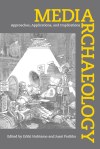The Physicist of Media Theory – Friedrich Kittler’s Optical Media
Oops. I should have done this a long time ago, but better late than never. Anyhow, it took several years anyway before it came out in English – Friedrich Kittler’s Optical Media (Polity Press 2010, orig. 2002) – so a little delay in writing about the translation does not hurt.
took several years anyway before it came out in English – Friedrich Kittler’s Optical Media (Polity Press 2010, orig. 2002) – so a little delay in writing about the translation does not hurt.
It would be tempting to emphasize the radical alterity of the “Kittler-effect” (as named by Winthrop-Young) in relation to the more standardized and domestic Anglo-American discourses in media and cultural studies. Even the word “studies” is an abomination for Kittler, who is of the German tradition where “sciences” is still the word for humanities too. For Kittler, this is to be taken to its hard core: sciences stand at the centre of arts and humanities in the age of technical media, and a failure to take this into account would be like a bratwurst without sauerkraut. Nice, but not really the real thing.
This is one of the crucial points that a “German perspective” to media studies has promoted: media are not only the mass media of television, newspapers and such, but a technical constellation that at its core is based on scientific principles of coding, channeling and decoding of signals. When Kittler says the lectures (Optical Media is based on a lecture series he gave at Humboldt University, Sophienstrasse, Berlin, in 1999) are an investigation into man-made images, we should remember his earlier predisposition and tendency to talk of the “so-called-man. Kittler is after all a sort of a Foucault of the technical age (as also John Durham Peters in the foreword notes, instead of the usual label of Kittler as the Derrida of the digital age). Man is a temporary solution, a crossroad in the complex practices and epistemologies of knowledge that might (has?) proved to be not so useful anymore when media can communicated to each other without human intervention. Ask your plugged-in Ethernet cable, it knows the amount of data that goes through it without you pushing even a single key (as Wendy Chun reminds us in her Control and Freedom).
Kittler’s hostility towards any human-centred history of invention is well summed up for instance in this quote:
“And when Liesegang edited his Contributions to the Problem of Electrical Television in 1899, thus naming the medium, the principle had already been converted into a basic circuit. Television was and is not a desire of so-called humans, but rather it is largely a civilian byproduct of military electronics. That much should be clear.” (208)
That much should be clear, right? And Kittler is a techno-determinist, right? Well, as Winthrop-Young has in his wonderful little intro Kittler and the Media articulated, this judgment seems to be worse than claiming that someone enjoys strangling cute puppies, and hence needs no more than the accusation – whereas exactly this point needs elaboration. I am not promising to do that in this review, but just a quick point. One thing that we need to remember is that for Kittler, media are about science and engineering, and some of the confusions relate to how people are trying to read and apply him out of those contexts. Calling someone techno-determinist when he has continuously underlined that this is what he does – investigates the engineering aspects of media – is, well, redundant. Naturally this does not solve the whole question, but at least points to something we need to keep in our minds when reading Kittler.
His media theory is not about the media as interpreted, consumed and produced by creative industries, digital humanists, or such, but about the long genealogies of science, engineering and the qualities of matter that allow the event of media to take place. Media is displaced from McLuhanite considerations to “where it is most at home: the field of physics in general and telecommunications in particular.” Kittler is the physicist of media theory.
Optical Media is in that sense reader-friendly (if Kittler ever is) that it takes as its clear methodological point of departure Shannon’s communication theory. Slightly anachronistically Kittler transposes this as a model to understand media history. How coding, channeling and decoding takes places in material channels that are surrounded by noise.
Kittler’s Optical Media has several problematic statements, exaggerations and mistakes too – some of which the translator Anthony Enns has picked up on and made corrective notes. In other ways too, the translation is excellent, and presents us with a Kittler that is smooth to read. Translating Kittler is not easy, and much gets lost in translation but Enns is excellently equipped to present us media theory that is vibrant and readable.
It will be interesting to see how Kittler’s impact will be continued. Despite the rhetorical distanciation from US and UK that one encounters in this Sophienstrasse brand of media theory – which is wary of the Bologna Process of education standardisation in Europe threatening academic freedom, of Anglo-American monetarized neoliberal discourses of knowledge, and the general forgetting of old Europe and its philosophical traditions – recent years of English speaking media studies picked up at least indirectly from material media theory. Such ways of making sense of technical media are visible in software studies, platform studies, digital forensics à la Matthew Kirschenbaum and other recent, exciting theory debates. Kittler is being read. We don’t need a Kittler-jugend as Winthrop-Young has pointed out, but Kittler-effect is hard to escape; the big question is how to take that forward to as innovative directions as Kittler produced.
What is interesting is that the lack of German language in Anglo-American circles has produced a situation where most scholars are reliant on translations (I am glad to see Polity Press putting out Kittler-related literature). Hence, a lot have also missed the “turn” Kittler has taken during the past 10 years from war to love. The writer of post-humna media theory talks about love, sex and Antique Greece in his magnum opus project that could be summed as the attempt to place Jimi Hendrix (Electric Ladyland, And the Gods Made Love) in the age of Homer. The other Homer than a representation analysis of Simpsons’ Homer.
Notes:
1) Disclosure statement: My own new book is also contracted with Polity Press – Media Archaeology and Digital Culture (2012)
2) Friedrich Kittler’s last talk at the Sophienstrasse 22 address, Berlin. The Institutes are moving premises during summer 2011.


















Good review. That being said, your claim that Kittler is skeptical of “Anglo-American monetarized neoliberal discourses of knowledge” accurately captures some of Kittler’s and his colleagues’ claims, but also obscures the fact that much of Kittler’s discourse is a kind of apotheosis of “Anglo-American monetarized neoliberal discourses of knowledge” — hence, the reliance on Shannon’s theories of efficient transmissions to develop a general account of communication. In this regard Kittler tends to magnify and expand the types of arguments that were in vogue in the 50s and 60s among researchers supported by the US military (Wilbur Schramm, the Rand Corporation, etc) and re-package them in a Germanophone, Hegelian facade. Kittler’s own comments that his seminal media work in the 80s stemmed from his time at Stanford and Chicago corroborates some of this. This is not to undercut his brilliance, importance, and originality — his importance on these points cannot be understated. However one might also do well to resist these categorizations and oppositions between “American” and “German”, and wonder weather Kittler’s innovations in the 80s, particularly his advocacy of general and standardized accounts of knowledge guided by efficient technique, somehow embodied, enabled, or even prophesied the types of changes currently underway via Bologna process, etc.
good points Bernard! Just in short: yes, I agree, and emphasise the same regarding the oppositions, and their artificial nature. The institutional points you pick up are excellent, and fresh insights; earlier some others have picked up already something concerning the intellectual traditions. Furthermore, and I elaborate this point in an article forthcoming in Theory, Culture & Society, the opposition does not hold true when one sees what has been happening in some new fields of media studies especially in the US: software studies, platform studies, and I would even claim Media Archaeology…